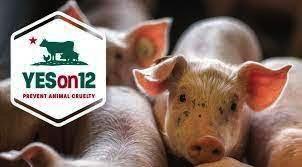 In the majority decision handed down by the Supreme Court of the United States (SCOTUS), it was stated that if state legislation having an effect on production systems in other states was undesirable, then it was the role of Congress to enact legislation to that effect. Accordingly the Ending Agricultural Trade Suppression (EATS) Act addresses the challenge presented by SCOTUS. The Act is co-sponsored by Senators Roger Marshall (R-KS), Chuck Grassley (R-IA), John Cornyn (R-TX), Tom Cotton (R-AR), Deb Fischer (R-NE), Kevin Kramer (R-MD), Joni Ernst (R-IA), Eric Schmitt (R-MO), Ted Budd (R-NC) and Bill Hagerty (R-TN).
In the majority decision handed down by the Supreme Court of the United States (SCOTUS), it was stated that if state legislation having an effect on production systems in other states was undesirable, then it was the role of Congress to enact legislation to that effect. Accordingly the Ending Agricultural Trade Suppression (EATS) Act addresses the challenge presented by SCOTUS. The Act is co-sponsored by Senators Roger Marshall (R-KS), Chuck Grassley (R-IA), John Cornyn (R-TX), Tom Cotton (R-AR), Deb Fischer (R-NE), Kevin Kramer (R-MD), Joni Ernst (R-IA), Eric Schmitt (R-MO), Ted Budd (R-NC) and Bill Hagerty (R-TN).
The proposed EATS Bill states, “The government of a State or unit of local government within a State shall not impose a standard or condition on the pre-harvest production of any agricultural products sold or offered for sale in interstate commerce if the production occurs in another state.”
 The EATS Act would effectively limit the impact of California Proposition #12 with regard to housing systems with specific reference to gestation crates. With respect to egg production the situation regarding Proposition #12 is moot, since approximately one third of all U.S. hens are housed in other than conventional cages.
The EATS Act would effectively limit the impact of California Proposition #12 with regard to housing systems with specific reference to gestation crates. With respect to egg production the situation regarding Proposition #12 is moot, since approximately one third of all U.S. hens are housed in other than conventional cages.
Passage of the EATS Bill through the Senate is questionable given support of the objectives of Proposition #12 and eventual enactment, may be years in the future. Irrespective of the well-meaning intentions of the sponsors representing hog-producing states, pork producers are now facing the court of public opinion. Although existing producers and packers can satisfy the requirements of Proposition #12 with regard to California and states with similar legislation, antipathy towards gestation crates is extensive. Many food retailers and restaurants have committed to sourcing pork from systems using group-housing of sows. In response, major hog producers and packers, including Tyson Foods, Smithfield Foods, Hormel Foods, Niman Ranch and others, have either converted or are in the process of phasing out gestation crates in their supply chains.